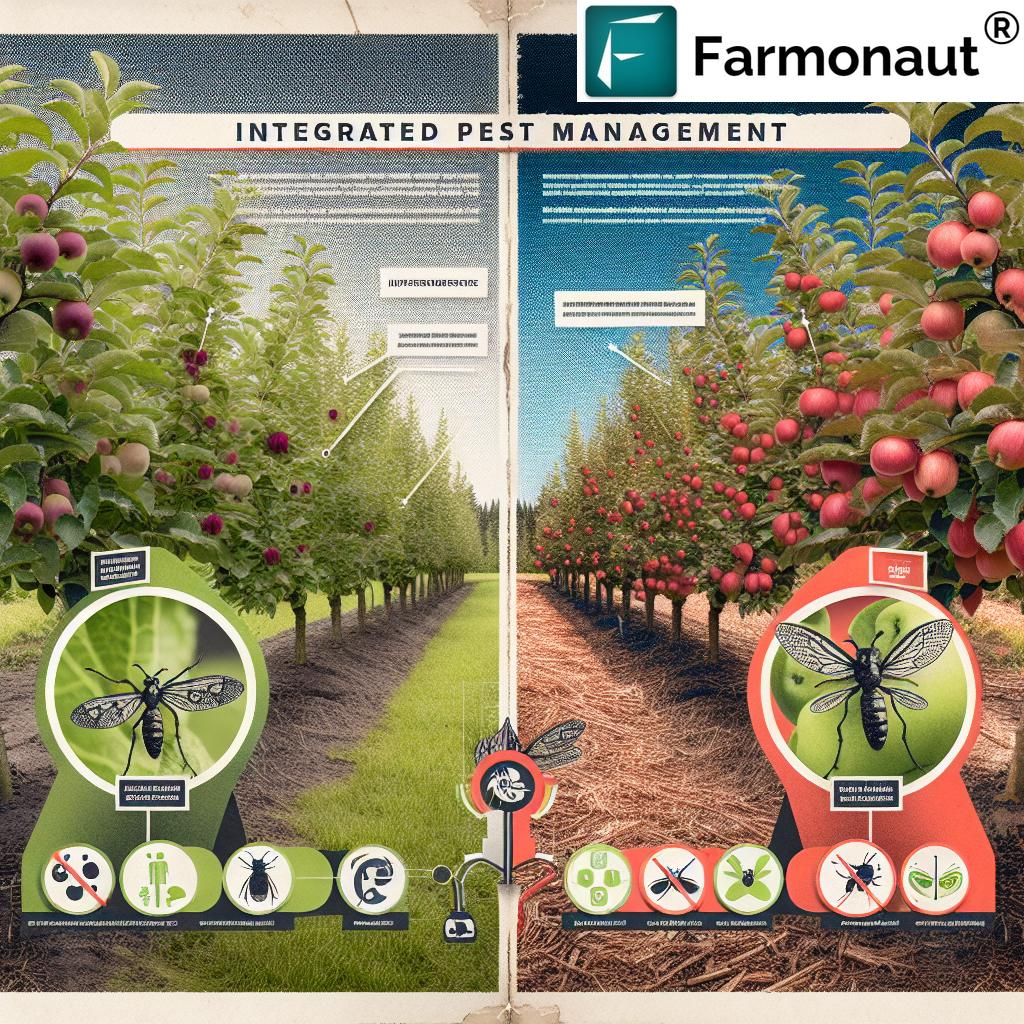Tariff Turmoil: How US-Canada-Mexico Trade Tensions Impact Agriculture and Supply Chains
“US tariffs on Canada and Mexico affect 3 key sectors: automotive, agriculture, and construction industries.”
In recent developments that have sent shockwaves through North American trade relations, we find ourselves analyzing the far-reaching consequences of new US tariffs on Canada and Mexico. These controversial measures, coupled with additional levies on Chinese goods, are poised to significantly disrupt supply chains across the continent. As experts in agricultural technology and satellite-based farm management, we at Farmonaut are deeply concerned about the potential impacts on the agricultural sector and related industries.
The imposition of these tariffs marks a pivotal moment in the complex interplay of international trade relations, with profound implications for economic stability and industry-specific consequences. In this comprehensive analysis, we’ll explore how these changes might affect various sectors, consumer prices, and the delicate balance of North American economic relations.
Understanding the Tariff Landscape
The recent decision by the United States to impose sweeping tariffs on imports from Canada and Mexico has sent ripples through the North American economic landscape. These measures include a 25% tariff rate on a wide range of goods, affecting imports that totaled nearly $900 billion in the previous year. The move comes at a time when the intricate web of trade under the USMCA trade agreement is already facing significant challenges.
Let’s break down the key aspects of this tariff turmoil:
- A 25% tariff on goods from Canada and Mexico
- An additional 10% tariff on Chinese goods
- Potential conflicts with the existing USMCA framework
- Far-reaching impacts on automotive, agriculture, and construction industries
The justification for these tariffs, as stated by Washington, is to address the perceived failure of Canada and Mexico to curb the influx of illegal immigrants and drugs into the United States. However, the economic ramifications of this decision extend far beyond border control issues.
[Image 1]
The USMCA Trade Agreement Under Pressure
The United States-Mexico-Canada Agreement (USMCA), which replaced NAFTA, was designed to foster free trade and economic cooperation among the three North American countries. However, the recent tariff impositions have placed this agreement under significant strain. The new tariffs potentially conflict with the spirit and letter of the USMCA, raising questions about the future of North American trade relations.
Key points of tension include:
- Potential violations of USMCA provisions
- Challenges to the integrated supply chains developed under the agreement
- Uncertainty for businesses operating across borders
- Possible retaliatory measures from Canada and Mexico
As we navigate these turbulent waters, it’s crucial for agricultural businesses to stay informed and adaptable. Farmonaut’s satellite-based crop monitoring and AI advisory systems can provide valuable insights to help farmers and agribusinesses make informed decisions in this changing landscape.
Impact on Key Industries
Automotive Sector: Gears Grinding
The automotive industry stands to be one of the hardest-hit sectors by these new tariffs. The intricate supply chains that have developed under the USMCA, with parts often crossing borders multiple times during the manufacturing process, are now under threat. Ontario’s automotive sector, in particular, faces significant challenges.
Potential consequences for the auto industry include:
- Increased costs for manufacturers
- Disruptions to just-in-time manufacturing processes
- Potential job losses in automotive hubs
- Higher prices for consumers purchasing new vehicles
The ripple effects of these tariffs could extend beyond the immediate automotive sector, impacting related industries and local economies heavily dependent on auto manufacturing.
Agricultural Sector: Harvesting Uncertainty
Agriculture, a cornerstone of North American trade, faces significant upheaval due to these tariffs. Mexico and Canada are major suppliers of key foods to the US market, and the new tariffs threaten to inflate prices on staple items.
Here’s how the agricultural sector might be affected:
- Potential price increases for avocados and tomatoes, with Mexico accounting for 63% of US vegetable imports
- Disruptions to the supply of fruits, including over 80% of US avocados coming from Mexico
- Challenges for US farmers exporting to Canada and Mexico
- Increased costs for agricultural inputs and machinery
At Farmonaut, we understand the importance of data-driven decision-making in agriculture. Our satellite-based crop health monitoring and AI advisory systems can help farmers navigate these uncertain times by providing real-time insights into crop conditions and market trends.
Construction Industry: Building Barriers
The construction industry in the United States is also bracing for impact. Significant imports of softwood lumber and gypsum from Canada and Mexico are now subject to tariffs, which could result in increased housing costs.
Key concerns for the construction sector include:
- Higher costs for essential building materials
- Potential slowdown in new housing developments
- Increased renovation and repair costs for existing structures
- Job losses in construction and related industries
National Association of Home Builders chairman Carl Harris has emphasized that tariffs on essential building materials would discourage new developments and inflate construction expenses, potentially impacting housing affordability across the nation.
Economic Ripple Effects
The imposition of these tariffs is expected to have far-reaching economic consequences, extending beyond the immediately affected industries. Financial analysts predict that retaliatory measures from Canada and Mexico could trigger recessions in both nations, with the US economy also facing the risk of a shallow downturn.
Potential economic impacts include:
- Inflationary pressures on consumer goods
- Disruptions to highly integrated North American supply chains
- Decreased investor confidence in North American markets
- Potential job losses across various sectors
As these economic challenges unfold, it’s crucial for businesses to have access to accurate, real-time data to make informed decisions. Farmonaut’s suite of tools, including our blockchain-based traceability solutions and carbon footprint tracking, can help agribusinesses navigate these turbulent economic waters.
[Image 2]
International Trade Relations: A Delicate Balance
The imposition of these tariffs has significantly strained international trade relations, particularly within North America. The situation has been characterized as politically charged, with the US tariffs seemingly reinforcing an “America First” rhetoric and utilizing trade as a tool of geopolitical maneuvering.
Key aspects of the international trade landscape include:
- Potential retaliatory measures from Canada and Mexico
- Challenges to the tariffs under the USMCA framework
- Implications for ongoing US-China trade tensions
- Potential impacts on global trade patterns and alliances
Mexican President Claudia Sheinbaum has indicated that Mexico would retaliate with its own tariffs in response, while both Mexico and Canada are considering challenging the tariffs under the USMCA framework. This situation raises concerns about the potential for these economic strains to escalate into a protracted trade conflict, further complicating not just regional but global economic relations.
Consumer Impact: From Farm to Table
“New tariffs could increase consumer prices for staples like avocados and tomatoes, impacting millions of households.”
As we delve deeper into the consequences of these tariffs, it’s crucial to consider their impact on everyday consumers. The agricultural sector, in particular, plays a vital role in this equation, as changes in import costs for fruits and vegetables directly affect grocery bills across the nation.
Here’s how consumers might feel the pinch:
- Higher prices for imported fruits and vegetables, especially avocados and tomatoes
- Increased costs for processed foods that rely on imported ingredients
- Potential shortages or reduced variety of certain produce items
- Ripple effects on restaurant prices and menu offerings
At Farmonaut, we recognize the importance of efficient agricultural practices in maintaining affordable food prices. Our satellite-based crop monitoring and AI-driven advisory services can help farmers optimize their yields and reduce costs, potentially mitigating some of these price increases for consumers.
Supply Chain Disruptions: A Domino Effect
The intricate web of North American supply chains, developed over decades of free trade, now faces significant challenges. The impact of these tariffs extends beyond immediate price increases, potentially reshaping how goods move across borders.
Key supply chain concerns include:
- Disruptions to just-in-time manufacturing processes
- Increased logistics costs due to new customs procedures
- Potential shifts in sourcing strategies to avoid tariffs
- Challenges in maintaining consistent quality and supply of goods
For agricultural supply chains, these disruptions could mean changes in how produce is sourced, stored, and distributed. Farmonaut’s blockchain-based traceability solutions can provide valuable support in navigating these challenges, ensuring transparency and efficiency in agricultural supply chains.
Energy Sector: Powering Through Uncertainty
The energy sector, previously exempt from many trade restrictions, now faces new challenges under the current tariff regime. Canadian oil, a significant import for the United States, is now subject to a 10% levy, potentially altering the dynamics of North American energy trade.
Implications for the energy sector include:
- Increased costs for US refineries relying on Canadian crude oil
- Potential shifts in energy sourcing and distribution patterns
- Impacts on renewable energy projects relying on cross-border supply chains
- Challenges for integrated North American energy markets
As the energy landscape evolves, agribusinesses must stay informed about potential impacts on their operations. Farmonaut’s carbon footprint tracking tools can help agricultural enterprises monitor and optimize their energy usage in this changing environment.
Impact of US Tariffs on North American Agricultural Trade
| Agricultural Product | Pre-Tariff Trade Volume (est. tons) | Tariff Rate (%) | Estimated Price Increase (%) |
|---|---|---|---|
| Corn | 14,000,000 | 25 | 15-20 |
| Soybeans | 3,500,000 | 25 | 18-22 |
| Beef | 1,800,000 | 25 | 20-25 |
| Pork | 2,200,000 | 25 | 22-28 |
| Dairy Products | 1,500,000 | 25 | 15-18 |
| Avocados | 1,000,000 | 25 | 30-35 |
| Tomatoes | 1,800,000 | 25 | 25-30 |
Political Landscape and Future Outlook
The imposition of these tariffs has heightened political uncertainty in North America, prompting investors and businesses to brace for potential further disruptions. The situation remains fluid, with ongoing negotiations and potential for policy shifts.
Key factors to watch include:
- Ongoing discussions between US, Canadian, and Mexican officials
- Potential challenges to the tariffs through international trade bodies
- Domestic political pressures in all three countries
- Global economic conditions and their influence on trade policies
As the situation evolves, it’s crucial for agricultural businesses to stay informed and adaptable. Farmonaut’s comprehensive suite of tools, including our satellite-based crop monitoring and AI-driven advisory services, can provide valuable support in navigating these uncertain times.
Strategies for Agricultural Businesses
In light of these trade tensions and potential supply chain disruptions, agricultural businesses must adopt strategies to mitigate risks and capitalize on new opportunities. Here are some key approaches to consider:
- Diversify supply chains to reduce dependence on single sources
- Invest in technology to improve efficiency and reduce costs
- Explore new markets to offset potential losses in traditional export destinations
- Stay informed about trade policy developments and their potential impacts
- Collaborate with industry partners to advocate for favorable trade policies
Farmonaut’s suite of tools can play a crucial role in implementing these strategies. Our satellite-based crop monitoring, AI advisory systems, and blockchain-based traceability solutions provide agricultural businesses with the data and insights needed to make informed decisions in this challenging environment.
Explore Farmonaut’s API for advanced agricultural data integration
Conclusion: Navigating the New Trade Landscape
The imposition of US tariffs on Canada and Mexico, along with additional levies on Chinese goods, has created a complex and challenging environment for North American trade. The impacts of these measures extend far beyond the immediate industries affected, potentially reshaping supply chains, consumer prices, and international economic relations.
Key takeaways from our analysis include:
- Significant disruptions to automotive, agricultural, and construction industries
- Potential increases in consumer prices, particularly for staple foods
- Challenges to the existing USMCA trade framework
- The need for businesses to adapt and innovate in response to these changes
As we navigate this period of tariff turmoil, it’s crucial for agricultural businesses to stay informed, adaptable, and technologically empowered. Farmonaut remains committed to providing cutting-edge solutions to help farmers and agribusinesses thrive in this evolving landscape.
By leveraging advanced technologies like satellite-based crop monitoring, AI-driven advisory systems, and blockchain-based traceability, we can work together to build a more resilient and efficient agricultural sector, capable of weathering the storms of international trade tensions.
FAQ Section
Q: How will the new US tariffs affect food prices?
A: The new tariffs are likely to increase prices for imported fruits and vegetables, particularly items like avocados and tomatoes from Mexico. Consumers may see higher grocery bills and potentially reduced variety in produce sections.
Q: What industries are most affected by these tariffs?
A: The automotive, agriculture, and construction industries are among the most significantly impacted sectors. These industries rely heavily on cross-border supply chains and imported materials.
Q: How might these tariffs affect the USMCA trade agreement?
A: The new tariffs potentially conflict with provisions of the USMCA, raising questions about the agreement’s future and the stability of North American trade relations.
Q: What are the potential economic consequences of these tariffs?
A: Economists warn of possible recessions in Canada and Mexico, with the US also facing risk of an economic slowdown. Inflationary pressures, job losses, and disrupted supply chains are among the potential consequences.
Q: How can agricultural businesses adapt to these changes?
A: Agricultural businesses can adapt by diversifying supply chains, investing in efficiency-boosting technologies, exploring new markets, and staying informed about trade policy developments. Tools like Farmonaut’s satellite-based crop monitoring and AI advisory systems can provide valuable support in this adaptation process.
As we continue to monitor these developments, Farmonaut remains committed to providing innovative solutions to help the agricultural sector navigate these challenging times. For more information on how our technologies can support your business, please visit our website or contact our team.
Explore Farmonaut’s API Developer Docs for detailed integration guidelines

















